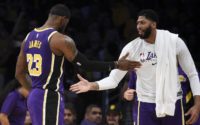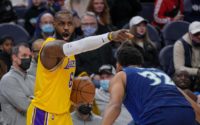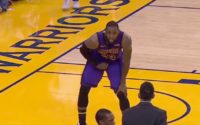LeBron James Has ‘Carried the Scar’ of Controversial 2010 ‘Decision’ to Leave Cleveland
LeBron James left the Cleveland Cavaliers twice in his professional career. However, his 2010 decision was rather controversial.
In the book “LeBron, Inc: The Making of a Billion-Dollar Athlete by Brian Windhorst” can read pretty much everything about the move.
In one of the chapters, Windhorst writes about “The Decision.”
LeBron is now a Lakers player. In his 2010 interview on ESPN, LeBron announced his decision to leave Cleveland to play with Dwayne Wade.
Even as the Heat rattled off wins in his first season, LeBron was so stung by the criticism that it changed his personality.
At one point, using his new Twitter account, he wrote: “Don’t think for one min [sic] that I haven’t been taking mental notes of everyone taking shots at me this summer. And I mean everyone!” Other times he’d post hateful and even racist messages people were sending him via social media. This may have been some attempt to create a measure of sympathy, but he was on a backfiring streak, and it only seemed to make people realize that messages they thought were getting sent into the void were actually getting through. The volume increased.
LeBron found it hard to let his guard down, refusing even to accept lighthearted ribbing by peers. When Anthony Tolliver, a role player, signed a two-year contract with the Minnesota Timberwolves for a relatively pedestrian $4.5 million that summer, he put out a video mocking The Decision and saying “I’m taking my services to the north.” LeBron bristled, saying, “I heard about it. I know we play Minnesota twice.” For a joke, that was out of character, too.
However, this angry version of LeBron wasn’t his true self. He tried at times to embrace it. Once, during his first year in Miami, LeBron played a brilliant game in Portland. He scored 44 points and was a wizard defensively, leading a comeback win. The crowd that night had been vicious in their booing—Portland was another place where he didn’t expect to feel hate, but it rained down anyway—and after the game he threw up his hands.
“I’ve kind of accepted this villain role everyone has placed on me,” he said that night. “I’m OK with it. I accept it.”
But he wasn’t. The next day, after I’d written a story to this effect, Carter called me. He wanted to know why I’d written it. I told him it was because LeBron had said it himself. Carter said that he disagreed and that wasn’t what LeBron needed to be saying or feeling. He and Rich Paul approached LeBron and talked him down, and a few days later in L.A., LeBron took back his words. The root of all that was The Decision; he bore it every day for more than a year. It wasn’t until late 2011 that he came out of his fog, promising to get back to himself.
But he’s always carried the scar.
“You know, I thought we were doing something cool, something
interesting. I still feel that way to this day,” Skipper said. “At ESPN we have
games, we have news shows, and we have entertainment shows. This was an
entertainment show. I personally made the decision to put it on. And in
retrospect, I just think it was ahead of its time.”
Skipper and LeBron share that viewpoint. On
this one, the regret is complicated. But it was impossible to sell that in
2010, and it remains challenging now.
“There had never been anything like it,” Gray
said. “And there will never be anything like it ever again.”
At the time, LeBron and his group didn’t have the benefit of waiting to see how history judged The Decision. It left them reeling, and it ended up forcing them to reevaluate things. It ended up as a turning point for his business career.



